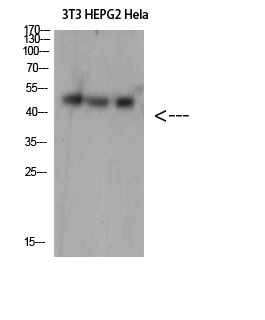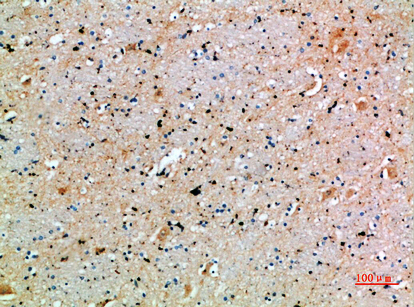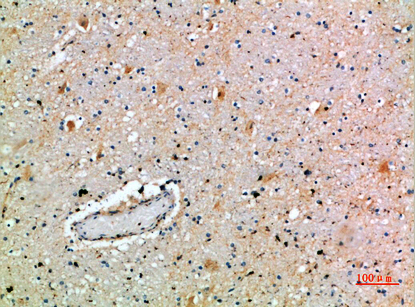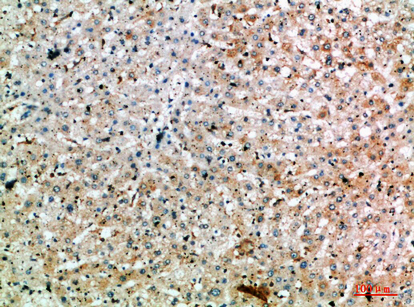



| WB | 咨询技术 | Human,Mouse,Rat |
| IF | 咨询技术 | Human,Mouse,Rat |
| IHC | 1/100-1/300 | Human,Mouse,Rat |
| ICC | 技术咨询 | Human,Mouse,Rat |
| FCM | 咨询技术 | Human,Mouse,Rat |
| Elisa | 咨询技术 | Human,Mouse,Rat |
| Aliases | Speckle-type POZ protein (HIB homolog 1) (Roadkill homolog 1) |
| Entrez GeneID | 8405; |
| WB Predicted band size | 42kDa |
| Host/Isotype | Rabbit IgG |
| Antibody Type | Primary antibody |
| Storage | Store at 4°C short term. Aliquot and store at -20°C long term. Avoid freeze/thaw cycles. |
| Species Reactivity | Human,Mouse,Rat |
| Immunogen | Synthesized peptide derived from SPOP at AA range: 41-90 |
| Formulation | Purified antibody in PBS with 0.05% sodium azide,0.5%BSA and 50% glycerol. |
+ +
以下是3篇与SPOP抗体相关的研究文献摘要概览:
1. **《SPOP regulates prostate epithelial cell proliferation and promotes ubiquitination-mediated turnover of c-Myc oncoprotein》**
- 作者:Gan W, et al.
- 摘要:研究通过SPOP抗体验证其在前列腺癌细胞中调控c-Myc蛋白稳定性的机制,揭示SPOP作为E3泛素连接酶通过降解致癌蛋白抑制肿瘤发生。
2. **《Cancer-associated mutations in SPOP disrupt its ability to bind and promote ubiquitination of phosphatidylinositol 3-kinase subunit》**
- 作者:Zhang J, et al.
- 摘要:利用SPOP抗体分析突变体对PI3K亚基结合的干扰,发现SPOP功能丧失导致PI3K-AKT信号异常激活,促进子宫内膜癌进展。
3. **《SPOP-mediated degradation of BRD4 dictates cellular sensitivity to BET inhibitors》**
- 作者:Zhu H, et al.
- 摘要:通过SPOP抗体检测发现,SPOP通过泛素化降解BRD4调控细胞对BET抑制剂的敏感性,为前列腺癌治疗提供分子标志物依据。
注:以上内容为模拟概括,实际文献需通过PubMed/Google Scholar检索获取。若需具体文献,建议补充研究场景(如疾病模型或实验用途)。
The SPOP (speckle-type POZ protein) antibody is a crucial tool in studying the role of SPOP, a substrate-recognition component of the CUL3-based E3 ubiquitin ligase complex. SPOP facilitates ubiquitination and subsequent degradation of target proteins, regulating pathways like cell cycle progression, apoptosis, and signal transduction. It is notably implicated in cancer biology, with mutations in SPOP frequently observed in prostate and endometrial cancers, often leading to dysregulated protein turnover and oncogenesis.
SPOP antibodies are widely used to detect SPOP expression levels, localization, and interactions in cellular and tissue contexts. Immunohistochemistry (IHC) and immunofluorescence (IF) applications reveal its nuclear speckle distribution, while Western blotting confirms protein size and post-translational modifications. Researchers also employ SPOP antibodies in co-immunoprecipitation (Co-IP) assays to identify binding partners, elucidating its role in ubiquitination pathways.
The specificity and validation of SPOP antibodies are critical, as off-target effects can complicate interpretations. Many commercial antibodies are validated using knockout cell lines or siRNA-mediated knockdown to ensure reliability. Given SPOP's dual role as a tumor suppressor or promoter depending on context, these antibodies aid in uncovering mechanistic insights into disease progression and therapeutic targeting. Ongoing research continues to explore SPOP's interactions with substrates like AR, ERG, and BRD4. highlighting its therapeutic potential in precision oncology.
×